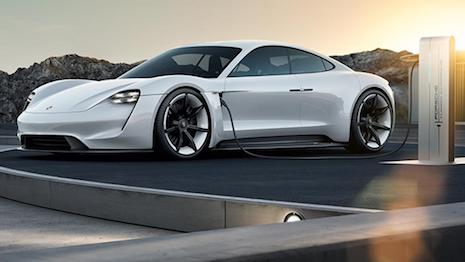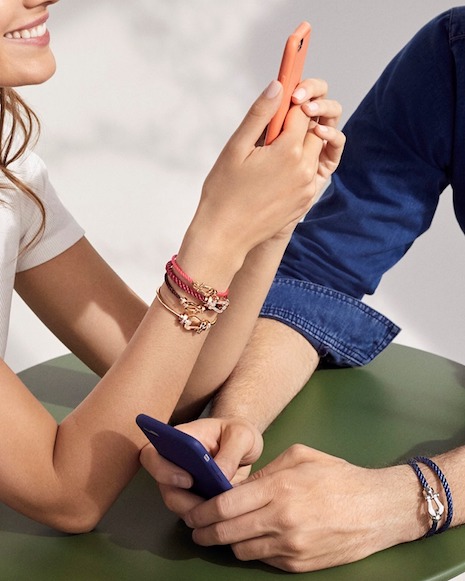With increasing attention placed on sustainability and the footprint around consumption, the stigma around pre-owned items has lifted and given way to secondhand as a form of status symbol.
According to a report from Ford Motor Co., 62 percent of consumers would rather buy something used than new, provided there are good options available at resale. While sustainability is impacting how consumers shop and how they select brands, they show more reluctance in changing their mobility habits to align with their green goals.
“The rate of change globally has been on the rise – and without the trust in the institutions, brands and peers to rely on, a majority of people are feeling extremely overwhelmed,” said Sheryl Connelly, global consumer trends and futuring manager at Ford. “Consumers want to believe that companies are doing the right thing, but companies also need to give them a clear reason to do so."
Ford’s report is based on a survey of 13,000 global consumers conducted by Harris Insights & Analytics.
Value driven
Out of all of the age groups, Gen Z is most apt to feel guilt about something they bought new and never used, with 67 percent of this age group relating to that sentiment. Comparatively, only a third of baby boomers agreed.
As more emphasis is put on the environmental impact of consumption, 60 percent of consumers say they are more open to secondhand shopping than they were five years ago.
The high-end pre-owned market may help, rather than harm, the overall luxury industry more than initially expected, according to recent research from Boston Consulting Group and secondhand luxury platform Vestiaire Collective.
Resale platforms are often one of the first ways that up-and-coming consumers access and purchase luxury goods, with 71 percent of pre-owned buyers gravitating towards items they cannot afford new. Additionally, secondhand luxury appeals to more environmentally-conscious consumers as it keeps quality items from being discarded (see story).
On a global level, 78 percent of consumers say they are taking steps to change their behavior to address climate change. However, six in 10 consumers say they are more pessimistic than optimistic when it comes to the possibility of fighting global warming.
There is a disconnect between consumers’ eco goals and their actions when it comes to mobility. While 56 percent say that individuals should be driving electric cars, only 17 percent of respondents say they have actually made the switch to a battery-powered vehicle.

Porsche's Taycan. Image courtesy of Porsche
This could partly be due to a worry shared by 72 percent of consumers that there will not be enough infrastructure to support electric driving, such as availability of charging stations.
In most markets, about half or more of consumers also say that they will only make changes in their habits if there is a small or negligible inconvenience to them.
While consumers may not be willing to make adjustments in support of the environment, they have high expectations for brands’ ecological values.
Three-quarters of consumers say they make purchasing decisions based on whether something was produced with responsibly sourced materials.
Aside from pricing and quality, the top aspect that makes a brand attractive to a shopper is transparency, followed by treating its employees well and demonstrating ethics.
Consumers also want to buy into brands that reflect their personal interests and values. Sixty-three percent say they are more aware of brands’ positions on issues today than they were in the past.
While trust is becoming even more important, the majority of consumers say that it has become harder to trust companies. Additionally, two-thirds say that once their trust is lost, they will not do business with that brand again.
Despite the growing emphasis on causes and corporate responsibility, 59 percent of consumers say that they care more about purchase convenience than a company’s values.
Making a connection
The study also found that a significant portion of adults around the world report feeling lonely at least once a week. Millennials and Gen Zers are most apt to relate to this sentiment, with more than half admitting to frequent feelings of loneliness.
Six in 10 adults say that social media allows them to combat loneliness. However, while digital media has allowed consumers across the globe to connect, four in 10 millennial and Gen Z individuals say that social media actually makes them lonelier.

Half of Gen Z consumers say they feel lonely even when they are around other people. Image credit: Fred
A number of factors are driving this trend, from the rise of single person households to a decline in consumers joining traditional communities such as religion.
Brands have an opportunity to help individuals connect and feel less lonely.
Aside from friendships, personable interactions are key for retailers.
While human customer service is important, shopping experiences are not living up to consumer expectations. Sixty-seven percent say that they have greater expectations for retailers than they did in the past, and half of consumers say that bad customer experiences have become the norm.
This could be partly due to employees, with 44 percent of consumers agreeing that workers do not understand their needs.
In a marketing environment that is so heavily driven by digital experiences today, company values are getting lost, which can have brands losing out on double-digit growth.
During a session at Forrester's CX NYC 2019 conference, an analyst from the firm explained that brands and retailers who help consumers live true to their values see greater customer experiences. Companies who focus on driving their brand values internally more so than consumer-facing initiatives are able to become true "meaning makers" and see significant growth (see story).
{"ct":"PIJ+Aexr8jOCo1vIi3jBlpIQPka+fKWGsnUWB7AR6iW7uN8o1GbV3IBBZDdE0p8iN0sd6FSUOOJh\/+q88\/QljB7y5fR0qpiqf+xJd1Dt9GJePgSMgJxJLpDv\/MIb3pyw+A44F3QeLL3e6vw3sktBvcdyiwpgru5LihXIZ0AKnCRyP\/N5L9qz+rlj78+s8X\/CCWx6CgAKsKivpYDWT1nb7C5iVE08GJdE9P5Z4pBwSDBZuFH73QOMBxsPLyjfMVHTQ0CHYArMl1Lyze0Vf50ZBH11Pzp4Q4GjMQ7gfQqKf2nda3d8LjnXdkoBBEYINJL1DkAEnXjnSoSzoOB2rc5IZZ8rUGDXzFqFGazkm9A6bml5ON1bmRKUJNDg7zdFSADdV1goTRmSB9eVbXY6fH4dJ+PWVkuJY6pQs\/2sWPws765\/yJ76uuCjzWNtW5THa8YZSxAEu2mfyD18\/iluaP4F4gwwpZRJsZyGd10QzAqhsjAz1+RKsyOmvMClfsJI40UvJAiihu+4+BpMX0h4l+pvYR9Tf\/lDFS4EKPWBF7XdA6I2e590R3+P\/OyWFe3KoOPPoN0zT1bfasDxDU+HRg3Quj3O6edh1KjDZ8x+PXbPsGDyXZRAf78xXw+zY1d4Mo26r60DIcSWdVFKJ\/KPgKgJwcL0GazbJL6echDiUyYC+5LV1YBGAyzhP5q72Bv5uwWDGgxiDTuGb8PcLtS6rxNH2ZVi67EUgiql8UEOa1kmNEbmm4hQmTy7MlyFBwKXTbUtdPthHYG4A8DM5IeCeN+lwinGaIxEd3MVzHpCYh2\/7OHv79jKv\/RNDOv6WN08I6udvghMsJIBspF8DCE\/TLAW2sESClh69AAXlmB9b8nd71uMBlAl00OqC10Vv+LlHZk0ivCjENv\/8GRDzIcnDt+GWn1fHWfKv4fR1qgDcTYiaBkN2Iv6ebcEVO8DUu7mzr1s2WxByy0Yh1W1k2RchaZEeNgxJnLmm8hA2v+Jrvgf0WVwed\/sZFbX0cby8yTo80KEiWaJshgGH3DSm48Ov3naGNfhP7Xepa2TwacEsw4yek14pXkI3nPksSoLGf5zCFAC6Wkv0FuE86lnCUSAEV3h162QRdHiSwYFZpuM+m7XfoP+DrfOgg0cqWAcSAqS02QfGAWI5G65sT3nvrL1o2VtL7gHQLNxWqBik6hbuctdFMytdPzrNXcRBiGB\/9B2tClRr0e3QO3ZxxYPPD6vh9J+vRucyCOHgXOQsKhsvyuK7NU8UknUu3TAI0aFVo37zXM37s2cEuuOzJYz5CIgAM5VrL2ccRtFQMS3YFYAhhCACb3\/32lP9PbI3L1DqN8oclc459vq6wq9rev5+k2J+PsdCGP8YEDYSJCAu2PhBxBTauW2Kk0MKKgS82mnDiQqzuK19AJTaYNN\/zl0tDIya36k2cO3YY1gPzAghZh21eHZRJDaO8lM5MyG\/\/xExlZ+ruSaiqxgSR0i\/UrWSaN5ug6rJpZkWnx7SjnWNml98wkI8OPgJ3AJjRlZjicHXhDnDIIpieHiNanAhDWnnIxNRKqHTUwaRUqZzARIlwTaFins\/DQoSStLE903Nf19A4t\/w0EUKT33ZfLc6lEI+jwyuQqZf\/BbDlXZ9ur+ykruCCDF+HRvwNW7qvV7c+HzpKq0v\/fXM\/PF3fauSb85rMgdmurRCQmdR2L87pxVN\/S8tU0\/M4YibBhUkeUNA\/\/9ZFIud4rnGZGIvLQqwWvlc7vwKAiMXzkMGv5e\/c6f0SOfUBpUItseiJtsPo8GLqYrs3TKVVypdcpqT0MZsQgUHBTI+PSuJh0xUaStDhyfOfrUgwFiWFLTXBnTKTiSIyOy6M1CpGdTzKV3k2e6VwPV3gNgW9hzg8hnSicXU2PxaskkOFIyN601HDEQzHMTN+Y19hd+\/8RPz9oQ6NAmOHTN1XaPNZ9717c2OLrwtwfqSK2J8wdzHo0\/d59Ksq9bGYE6lqCc0ZlGD\/vqQ7j+wlKf3UM2Q4k0lHwF4Anao\/55EmDxfjx08042Ker3PT3TDzKK\/QAz8euGhqreVoVF5ny6k3EXWCoqiD7OVfykHt+cMbGH4Dv9wz835mWybsDQixrfyz7VSru1nxjdh8WhcSuzduBNEtXDyKHWAp94ybBYgiOKsqdE+GSPcOSm5pD2cL3r5hjPLO+CMi9PL6vv9S\/ctXVIJtIRnpIUsKkOcOH0e5Kc\/1Mw3IOg+JjG\/090jVK\/v2tOWM9uuVmjs+4R3SLbXKqI1FF3jZH67myzVYAmLMeq\/Fe7pJvf\/R1P6VF+3ZtqsbnPD7HfbA\/RjaZB3h\/JO9a\/NrI7lS5\/PxwvdvZQmGTc8aqySxp1gfPlAfye5sKw6bZRNvgLcFSiaAZ4ZPW+CoR9qxGGhbZ8bCRGF193I3nfGSN2mQG5Yf45zEGMvOPemvP9sKcAvc6bAuEqmpAVVXEWg+CthF01TJSPRGDydbR57fLpiVJrG4CaonyzpjNyPzwigWFCL4EVwQlLb+5zVm0hr0Q\/xm6rkuR6qoP1z\/cP\/EcQdUm7Q0Hz3rAWlW5SJHTcZ0DSsZid4KdRUA6bx7Uiwurb1r0aRmNIkmQAyjyIT9O1QhtxQTHA2v84wwx1LIHD3IPWfvklklSMWqIH1HpbyjXdIjso1Fr4K6JB+fI7tEUZHuircWqvNQgaQi1qYMh67NXA4PZury8n0D4FiGw9YIL3IRVXGcIl7nPF\/LbXYLelnz24AlSrG99r8magQLPvwIUfwDF5jbe5cXwFybQSoj8\/BEf4\/MSMx1cXnhWQCzqhRlZ0dG1ASg2XAKlWPYGExpc1fqq08X5BWoA50TCRASV1344+fJheHahXoZIcl9\/Lqxw+2jnGjl\/SkqBwibqBJvl83ySOHuhzEtdIS30yMjYT0axOM83S1a4TviPtMmpNsaEoxQDYBaTR+Rag6iLPgxF1oqUt800szoXCdD14ucHrutLoUB8ac+S95UGjZ+6w\/299mJGHEC49AC50u\/ZYygI\/8uGh4xBFgirxTNUSDQdzT4760BDc0R7wqABSdie2NOVB2\/3eEmIZM+k35\/iQyd2cJ59iBeX2KHrDNfZulfJep14XzsJ+ix+bD\/2TFewdhOH04wwARg+H46kvFOL0ryVvegTaZawkx7l2TqVgLNBRFHlmMkPwpbVNxZ6rFAeXtwnJQcUP7\/9k4AOsT9nX52GwlrySP+p0iyAclYINTKSqYINvitMuUS+tsLAnhu\/I2whVN35Sk90Wcd+Owng5Tn+KacsxDeaIeDpU8q50VIYvuLNoaae0OMUZiQdnulWB7dIdHvWdihVh3yp2WK47ophPr7J\/9nm1AUjVUUZZ7ssX7cdfMJ1Phfwfskb\/ZPXlLzgJW6FxOMu57unCiLOFluwVDR3rfBwOSQB9ZgrPxJnd52yZ0kKfwK+ufAFb4xi\/504STS90WWr9WX+NTlnJNRiUs+x+WYNGxlMg7QIeABvS5B2sNxYeRlCi7TrRKHTmtjgd1IAxLEapCEjIQqCLhztMPMJk4ODBPbbqrTKuDFf4nU4c+wiDYDtfP60RmpgXnVJjymVCJs1LCyYwO8dgXygo0o9GfwjfUwsSVSoHN\/P1tbZvENqiJYUHDewv+G5Fa2SBGWH1BPhO1J+xxdWuOiABLPn5CZxEM5TKZ\/fuHAKy43GDnhDNip6g7tZJu42ZaXVAcllpTvIQOC24nXxYJA9Wb9HPt1CU9Ld2XgeeTva0IbfF+\/gJkoha5Fwboq3UrhJfVJVzEicZCe8Z\/oDZTVGEueN5H6CfBJ0QAzEQxApJrW2imOm67n6sZKHrY+MIgQfG7UtezhEuF5FXrnwdub9NOsvTjd8nGfu72gOFc9qROQdguvrALSMSt+tWh4Ra75OfJ1F9yrnH0hvBbnqKtylPkoiRE9YMgb2GTVngwyyFwyBh+yVTMjLk4VGApGbT0jFvCYR2NJCPLehb++6FH2lltloZ5XxJnqZa2CYFbGZ7OtabwDNopb\/VNZThIa9AYvMeSNFyKtDzZQ6N8VwKC7c5vA\/N2uOHDZ\/B1UOG5WikTJSSKPvZcMOCRNLiI3mf\/kVfhG8vOMYFgW0\/sVV+7v3ksYkhCA6TyuorZSNTsfQqmmL1vHphD+KZOHbq06PfqoozEtZ4BFQDGOweQjxddepYB4pSSG2pv6e2sCHQGU36ER1+\/LzWsvS\/UrlIHftvxY1\/ntPWF3BNqsGAh+Sjtl7gqR03LrSnS4wG4ULIbIUOF\/Hq59sTjZTZcSFhm46N0xKpuQ+3QOYoHmjUIs37HQdU+dI23rsiqkDxfizbEXBWOt2NMMu8iMCnLbouXle4J5qIMYBhcgHqz\/P3+2wbeNPVk1Dl2RcP9jAYDirLxKLi1btOHu0HGJgqWhOGo2ml1\/Tov9qZ1FKRcmyhwoVBSk4tOnjvfwjbemIrtb4SUjNapPnDVSaa++SKS6ZH2MrppmzzC3Jl5t32jg6OFSq8iI2XyKT3DL\/20jQP\/G\/ucNjUUZIastdIMOXRIUOFCR\/5jlT+cLwsQ2YOVpwyuqxu+apAQIid7gG5pTTGQkP25maB\/96zXxbNWOtGfkfHFYrluH0VBoE7MOmTrKohNlETogs3Gel5gLgjQwExfqC90piYOJ4GeQ7z1G6NGeR3oq7x1dRsw3B5PMWatiwGRr2eGiV1S8F6UX7SUlcLj9D2mHIv22HJDraVnEBfIub4lEHGCENZ46fKm193r2z7WQlUBlpZxTejwQDNIH3ldwB1w6cMkplh\/waw2y7RYSm87vVxG2vbhFJOjR9xrCzGPohd3zxQvNas0vUR91lkbTDb5GfSJSRfTAqFnOl8djmkqKntRG2BjeaqK7vLf3+R5gSUz4aP5QpNgpNp+JRiiaQ8VRk5N+Obe9WTaXluGyOspKY\/NKneN\/OWIe1hBhp01My6LL10qeoKoemUmtQRqlRu6R2v0qvbZpRXzH3VJg9unPQ9U8S+pHy06LrGGh7fXobsvgno\/1v8NZ+IAOH\/CFeHdUt6iLbIspnYhWgV4KUdgxVP1orwVmfyqMbZ7ufcHAvsOSUvIlVulfTDgoyUaq3YYkbUeZ4b9TY3rhjzb24nuPDNxjojYFn704eYpC5O9lkgi01DcxuF7wgL8e1SHZIagEPLzd7hx3iceJ4eKEBHhI1Q8IpA45NDZB0J0D44K9n0zUHiIgZy7rGG4pAWeXG5v2wHVIHMmssW+OjZAO6Y8ZJ8rsvIgHn62u20jp1wtlP4gqSH1+bXzcO8UVZUymlxNBYgOizoLsU0aMKJJCJzJwMJ8TscKWudDAWrJasXFGE77KoaQn0wmeiTxq+a1L6ZIH1xeAn1ms+mIhweGX+MTpENQbx+j+MCB8AptlcnxiJF4FGEdgPVeDYfvkgeh9m1irPxSHfhiW+4TPp\/Wys3Nk0jfNSwSmoBOIAdq7teDs11OUQwa6WINc4ZyECDRkrIOhwMkKDGETZtMmTQ1D2uLCSTIzLqidZQLbkARSy7NMjrTkEViqHwo0nNcY0hyEhyIsDWY\/LmxB3a1HlqaS0D7pX+GaHpisX9pHzTKYm+bKj0FDYeI63Z7\/iyPeLpXQtV4SuJyOWDEEX9uYJFiUuTNcvKWt0PMWRflCKccUV18fTenVhivFV7f\/1g3p0h1i1DcwhVnO0x\/kpDjOGr3wWdaRwk0zZMSllcrjHgwbvdPwcVP9UW3eZmOctvg2keyk0I49BCV0GoQNkJRSy1JY8EjACwr0W5Tenj7bURi1bjY1UKlXUUsmJlJhLLxPf\/lVBbfI3wbD8xGp1dqZ5S6neuEvhOVNLZlebU04469xNwqnBtmZH3OIogEcFUprsmbuvKEpcpLiv3S99QR9oEJQ1TxgJS26Gj2LOrh6T3rhsf0eaVpejtjjt3xegBINOpk8sJUuoOSMx8AHn8Q9Au73tvg9PoAvXfrgOvHM6M9VixNUGtt6ulMAE0PGTbH6YqlWy+m+M4LK7xK1Ha3uQSwI\/EgBAoYc6aQn9J6ytg3IxtTlzVODm3Wnox+chVuAt1OmUK+l\/EC2EvvntM0KeldqQxn3ZdubhFtDtSeQbAgCwfc9vC9AZiG4w1y4Ct79DLRurJBLGS98afIiP5aFfgH6bFkroQjxQERkOFPxwEKE5Fd7I9TVUWzuGFVs0YZrGe5zjE3k0t\/eBsdxxl97pCmk30BL3A7VrjMHl18bGwaiAhhNfPhO7BvEEzAAnz8oRvhzz+R5fEROn\/krjPFxm7w7z6kGT8CXmfjk\/SO4V86q6bLwz\/mx0uSDBggitcajl4zIcaf7BqvBLmtPHAfZTuzJhnNYj+45IeVglkjw0PKYB5fQQO9k2zRlv5r+k0hK3TRLxC6F8aLWOQVO1iaOBypuNKvNS2btPVpSAkDIN1xMEA2YfF33BsrpW9GDAO51ktDf5jiDHcVeqefnRZz1V+yeNpH9CrYwIXlZfNewZxXh6kWrlU0lipxw3S9FI5iK7K4g8KV9ud7TXEsQYIUpP27cEcV\/t5d24fmoVPy2yC6B56Bd+mz9kS8he1vA3NMGF3rHx39JG4gj0hLFw2XIN8K4i5yvGyClbDOzEnkXTZjmvppt3gaHwyuap43B3HhE9pnmsN0r\/zDsEV3jhXHojLaGprdxYt\/rnLdkRO22HlopR\/4pP9HCGgT2R8WtgGVSymy74UElQDDnMwds3FAEzA4XYzZeoFNvi8HSZtRFojRu3UlEtvxibVTIcVTf2Z2Rrk7zI3izVp1VfgHsufac754BTcq\/WZR\/JTZQ4paGISCLWXsFchGDqjTG17\/mGa4Af+A37cuOJIu4r5e7md3oRy\/RWFEe4ZxwN+Va0sr7yQ4FBPGhaOX3nG2GCS78ycOLqNp++TcJ0vOdNV1qrkpN2QekElpiD90UzuwUxMwvXNL9xfBn9+6YlBBnz9F\/+7UWuvNsQU3FMgTtxjIffBtd5St+ukgPgIvl47QDe7hUv8ef44OUKSfNY6HOMWx9Xl+jSkGRsV8T\/KF3XSofmhtvWcX4lSPgufx3OY6ZZU5HwosTZasPQe7owg1m1On0iPNINDrdyF805jy2\/x+X7B\/l9q9A2bzd9vUxiPtPWbtYd9MRuIpm9XOL\/qnf27SFQyZiXb+7LEbr9mk62E8Hd4AHHITab233NiNCOFo94odyUyafROxJcIgFsVelI9vZvaditFEJuEpNZ1v1MV8OgvUMly954JGJdnG1R8W2hfvEU\/JJmuw8egjdBZlbuYnvRWsAfxfkq+6GcVuKQ21zwfiOyCA9\/iyg1+VDJQVr8BwBqCzAtf1BzDgSnqNpDZxGetpGzB4pA+xGcFRf7NLsFxuv7qyzZAIk25HNFRm3x82y2z8jgxWIexMBgchZLaoOEs0J0QRSlrkG+lFXGqtbrCfb2KO2dsDGkWBoqyFJgW7HtOetxGZtwv+NOdKxbtc6qIuVXvIQu9QdE\/WUJ5h7aosJlKHyLcyY0tfIhTXromRg\/hu4wg0fIkvhPyMZjVBOkFOv+g0A00W8R55dy4FVcOeitO+9vmJ9cQ83j0bvO\/Be\/9R2XgbMn8xif7f3vc0EfTLDurlFSSNKf1lP53tQzyve3YoxZdYtg6n3WfWH2kJVQieCWAN\/h+iJjJPokVymNHWdoDooTOm9kZYHhruwIDTDzdTZENiAVY9kr2v13tyzrOiLxUjhz8UO7upoGQC7aR+g3vrGX5QQWE4S74wcxjH69Yl5whojAy+fyfvKPdHqDI2BBvGeBbC1D3Z3aY+mJFTBvWsz5UtMLnm9J0WCqlXtfDEgyVSlSeCzCdkPRbSVZ6\/kOm2QwqTsl1ld1w50tnYfSEcsK1lAVaS\/BuG0JKUI81y16RXb7QioXbh1Ad3jUWh3JJOZmzsWzCNcSLYocGLyJKSghCvtVBN7A91hNte\/KLdQGHM0+0SkYZ1qEYrVJLB3zPaIjGSeiRc2R4ffO1rEGzWLVL9Lan\/PwpfgbsenC5XYMPj2BMmUsg0zddzMYGd2nUNKapNYszGdJMeahCoHil9Rq6lpK5CuasBETTPjR5N3S6hUa+yqaT+a8YEFeNogqB6KP4giQmAevbdpzxA2MMy4W4MuRswhUvtBDS8F0RCVx9fuHAzbdLf2V4ikUxstEEfeDwsmBNELClNdN4bc3FE6QoAnSwIdB+8zGF8vDEEnWRNyEb9gbvFgF4nYNSyFu7bqzc7oFxg58aokLiGw1AN+1EPWKvhBqOq1F87P0KmOzNkMBBhwCghxiDX0d7xCXRdjwIk2ZPAkBUuULwKQTCN9wLmx04SobF5vhnf7BpOexePC7gnihSSsNzvR4jjFHsu0VQ6y8gmpNclL164pp4rqFMIA7u17obqUnqRVRFIQJHn83Z2oZd55icyUVdw9ff6f3MozYxKnXwVoizzio20txA\/AaR62ggkK6IU+Chrun7Rtjpu7pxv\/oUkiKgt\/BmlbgbZOTYvPQI5CyF\/XB5bHo90Bw4rY4BKCLl5bO0UQsRt5lkDrrhN86XajA6e\/pjSuDfitBPao5mbXXfgacnRCzma5x3PY0YF+5\/TfSif6uHGd5WelhPPZ1+FKU0Jco4SPFiIQ1GCiMuG8qqHbAJ5J+sgDYiOeCpP8bKPQV6gng+7MYLqhZYhNQOFkxZi5uzWRvjaaUtCUeON4xP5C7V8aiQfCCZ7RFeEbMkLca9EJxzxOF5ZhNJ9EyXBlCdayuB0VExId6J0QQArhxQ3lpCWg4F5ETACWYgjzwldV2gPL9\/EcYG94HUjQVI7jG8EmZiZx3o95iyr0eRnNfagebZgn5hW8I2+fXKOgdxdfh8M9uxYfB3WSaLrVA+Q13uRX+hKtoi6uy6WSSQm7OT7Bt4f+mign0EgATM\/Rg1QjOwpb+7yET1tQZ1MITfE0XTuUQixB9U6Vh3w\/jajoRv0faa+EgQCQJ5NiL2so23vt6Y+TjarHIcrgGtCuZXexuUX\/NnDe5EENZB\/tSx5PotO6RoV8\/VJ4bbQHV1CYqBufxqjAHfdhCLWCwy6stLQCdkSyPLapATHmP6gNsgwN4aEKFfw6wj1ezp99KqLUa5sHxnXlcFhxg8yOn3Xh9hOVEdWVOoekbqX44dcaQ8HKAVrEe0AmAtM96YLkBvP1Vt0tQCwy6\/2dwsCx7KIUE4t5T4s+5SprMVBaCnFhqF506Yp1rPKhgTL39DrNlkpstvqBUbsozdU40kOdeKSh4Ek2FBQiqQ5W46pskUWfvfVxcMB0ivotBM8KIhw6BeyeT2XncVuImmv3rNxFKcAZ+L10E6p07SKdBCG0lbJn9lykA0una19WLkYiu9NfQv09yv2kEioTm5B2nrccNNjF48Lq6Y8vRjMVTqyggX+gMdhgpxeOVvN3KjNyegwOZlRY26uMuzhUtzjlKl657Th0LwctZqj2zjtMOHywk6jbxmPfX7Xcbh9PF\/UlNPs990i3spSFuIiwNKegXznVK3Qt5rWI6cd\/399F3P+krIRSMxA06MN4r\/YzFOJh9Cr6AD4B0zmnxpTyPqYnyzhzGEU8mO+86\/irrEjCOfzY0CdImU6LN4NY4EO0SNfyq8kHp\/ix2xH1J3HrdvdJzZ1+kV3mt1oStp8J\/qU6EbrFUlj0kqhwSqDpojV0H7uOvoA+dK1\/zBSvSioLGG7G7MhorqUwBcAS0UE4u\/1FGOrqpYfcj1Al5k1qnRPDxOGF3SNF3318Mugnro19\/7XHWWDJ17LMA52d5t0jl5DihZlaPG","iv":"8b42635947c0b557208c96e8895de226","s":"027f92aa43050ca9"}

 Vestiaire Collective AW19 campaign. Image credit: Vestiaire Collective
Vestiaire Collective AW19 campaign. Image credit: Vestiaire Collective